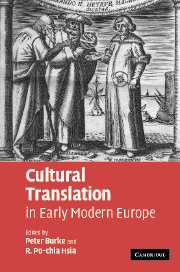Book contents
- Frontmatter
- Contents
- Notes on contributors
- Introduction
- PART I TRANSLATION AND LANGUAGE
- PART II TRANSLATION AND CULTURE
- PART III TRANSLATION AND SCIENCE
- 9 The role of translations in European scientific exchanges in the sixteenth and seventeenth centuries
- 10 Scientific exchanges between Hellenism and Europe: translations into Greek, 1400–1700
- 11 Ottoman encounters with European science: sixteenth- and seventeenth-century translations into Turkish
- 12 Translations of scientific literature in Russia from the fifteenth to the seventeenth century
- Bibliography
- Index
9 - The role of translations in European scientific exchanges in the sixteenth and seventeenth centuries
Published online by Cambridge University Press: 27 July 2009
- Frontmatter
- Contents
- Notes on contributors
- Introduction
- PART I TRANSLATION AND LANGUAGE
- PART II TRANSLATION AND CULTURE
- PART III TRANSLATION AND SCIENCE
- 9 The role of translations in European scientific exchanges in the sixteenth and seventeenth centuries
- 10 Scientific exchanges between Hellenism and Europe: translations into Greek, 1400–1700
- 11 Ottoman encounters with European science: sixteenth- and seventeenth-century translations into Turkish
- 12 Translations of scientific literature in Russia from the fifteenth to the seventeenth century
- Bibliography
- Index
Summary
DEFINITION OF THE CORPUS: A PROCESS OF REDUCTION
The aim of this chapter is to study the role of translations in the spread of scientific texts from the sixteenth to the end of the seventeenth century. My personal interests, my training and the lack of primary research in the field have all influenced the method followed here. The necessary means to study translations as a general process which could be quantified, or even mapped, are lacking for this period, unlike for the twentieth century. In any case, scientific books represent but a small part of the mass of translations made during the period considered, and I am not convinced that a quantifying approach would be particularly illuminating. This study examines the extent to which translations reveal not so much the transformations of the scientists' work, than the transformations of its cultural context. Being mainly concerned with the motives and aims of the translations, I have resorted, for the most part, to case studies.
This general orientation also justifies the decision to leave aside the most obvious corpus, and the largest one, in other words the translations of the works of the past (essentially from antiquity, but also from the Middle Ages), and to concentrate on modern works. This choice may seem debatable in a research programme of which almost half concerns the Renaissance, given that at the time the scientists themselves accorded the greatest importance to the legacy of the past, all of which is fully evident in the intellectual movement of humanism: quotations, editions and commentaries of ancient texts were often a means to convey new ideas.
- Type
- Chapter
- Information
- Cultural Translation in Early Modern Europe , pp. 163 - 179Publisher: Cambridge University PressPrint publication year: 2007
- 4
- Cited by



